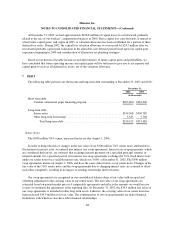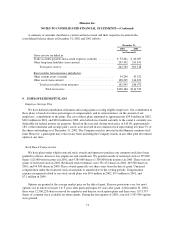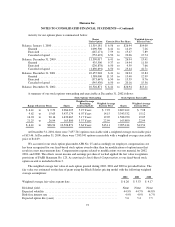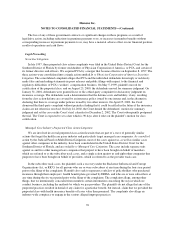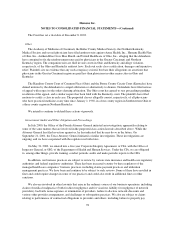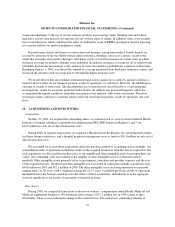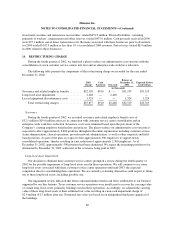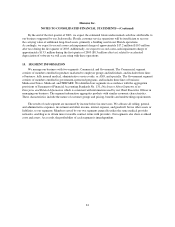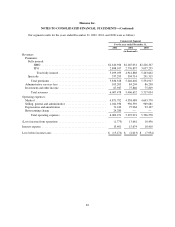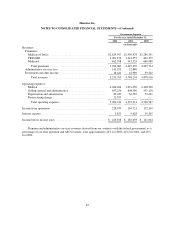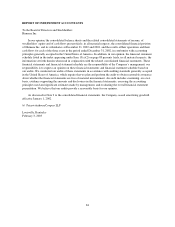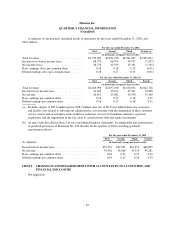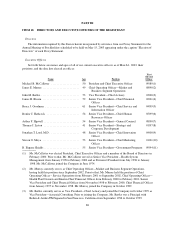Humana 2002 Annual Report Download - page 83
Download and view the complete annual report
Please find page 83 of the 2002 Humana annual report below. You can navigate through the pages in the report by either clicking on the pages listed below, or by using the keyword search tool below to find specific information within the annual report.Humana Inc.
NOTES TO CONSOLIDATED FINANCIAL STATEMENTS—(Continued)
On February 20, 2002, the Court issued its ruling on the defendants’ motions to dismiss the Second
Consolidated Amended Complaint (the “Amended Complaint”). The Amended Complaint was filed on June 29,
2001, after the Court dismissed most of the claims in the original complaints, but granted leave to refile. In its
February 20, 2002, ruling, the Court dismissed the RICO claims of ten of the sixteen named plaintiffs, including
three of the four involving us, on the ground that the McCarran-Ferguson Act prohibited their claims because
they interfered with the state regulatory processes in the states in which they resided (Florida, New Jersey,
California and Virginia). With respect to ERISA, the Court dismissed the misrepresentation claims of current
members, finding that they have adequate remedies under the law and failed to exhaust administrative remedies.
Claims for former members were not dismissed. The Court also refused to dismiss claims by all plaintiffs for
breach of fiduciary duty arising from alleged interference with the doctor-patient relationship by the use of so-
called “gag clauses” that assertedly prohibited doctors from freely communicating with members. The plaintiffs
sought certification of a class consisting of all members of our medical plans, excluding Medicare and Medicaid
plans, for the period from 1990 to 1999. On September 26, 2002, the Court denied the plaintiffs’ request for class
certification. On October 9, 2002, the plaintiffs asked the Court to reconsider its ruling on that issue. The Court
denied the motion on November 25, 2002. The Court has set a trial date on the individual named plaintiffs’
claims for September 22, 2003.
In the provider track case, the plaintiffs assert that we and other defendants improperly paid providers’
claims and “downcoded” their claims by paying lesser amounts than they submitted. The complaint alleges,
among other things, multiple violations under RICO as well as various breaches of contract and violations of
regulations governing the timeliness of claim payments. We moved to dismiss the provider track complaint on
September 8, 2000, and the other defendants filed similar motions thereafter. On March 2, 2001, the Court
dismissed certain of the plaintiffs’ claims pursuant to the defendants’ several motions to dismiss. However, the
Court allowed the plaintiffs to attempt to correct the deficiencies in their complaint with an amended pleading
with respect to all of the allegations except a claim under the federal Medicare regulations, which was dismissed
with prejudice. The Court also left undisturbed the plaintiffs’ claims for breach of contract. On March 26, 2001,
the plaintiffs filed their amended complaint, which, among other things, added four state or county medical
associations as additional plaintiffs. Two of those, the Denton County Medical Society and the Texas Medical
Association, purport to bring their actions against us, as well as against several other defendant companies. The
Medical Association of Georgia and the California Medical Association purport to bring their actions against
various other defendant companies. The associations seek injunctive relief only. The defendants filed a motion to
dismiss the amended complaint on April 30, 2001.
On September 26, 2002, the Court granted the plaintiffs’ request to file a second amended complaint, adding
additional plaintiffs, including the Florida Medical Association, which purports to bring its action against all
defendants. On October 21, 2002, the defendants moved to dismiss the second amended complaint. The Court
has not yet ruled.
Also on September 26, 2002, the Court certified a global class consisting of all medical doctors who
provided services to any person insured by any defendant from August 4, 1990, to September 30, 2002. The class
includes two subclasses. A national subclass consists of medical doctors who provided services to any person
insured by a defendant when the doctor has a claim against such defendant and is not required to arbitrate that
claim. A California subclass consists of medical doctors who provided services to any person insured in
California by any defendant when the doctor was not bound to arbitrate the claim. On October 10, 2002, the
defendants asked the Court of Appeals for the Eleventh Circuit to review the class certification decision. On
November 20, 2002, the Court of Appeals agreed to review the class issue. The District Court has ruled that
discovery can proceed during the pendency of the request to the Eleventh Circuit, and the Eleventh Circuit
rejected a request to halt discovery.
77



